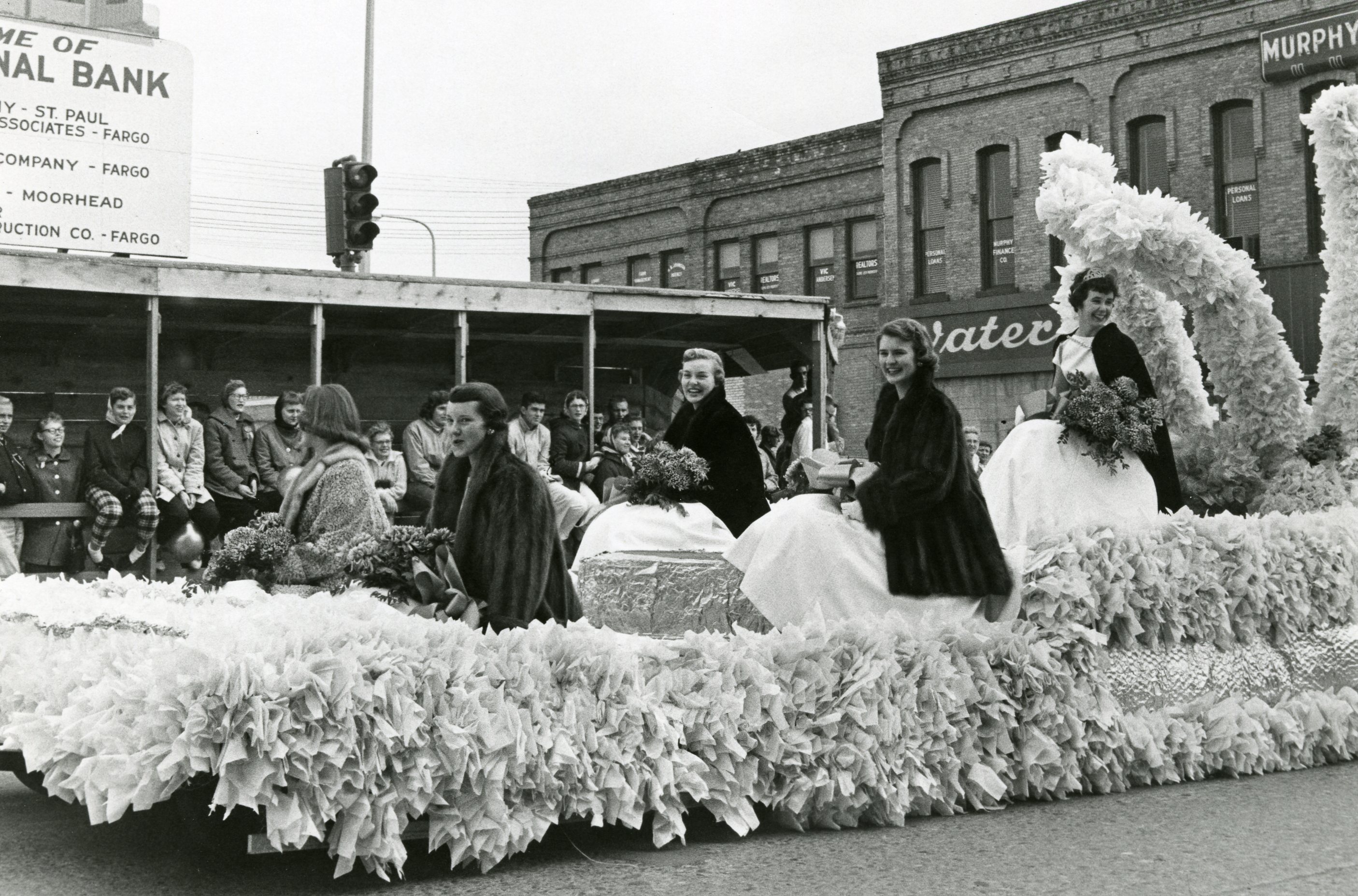 Concordia’s tradition of crowning a homecoming queen began in the 1920s. Student movements and the influence of the 1960-70s society affected the practice. Due to student concerns, the 1974 Homecoming Chairperson Ken Fitzer substituted the tradition of voting for a homecoming queen with the Don Awards, which was a recognition given to four exemplary senior students. The current practice of crowning both a king and queen began during the homecoming festivities in 1977. Concordia’s tradition of crowning a homecoming queen began in the 1920s. Student movements and the influence of the 1960-70s society affected the practice. Due to student concerns, the 1974 Homecoming Chairperson Ken Fitzer substituted the tradition of voting for a homecoming queen with the Don Awards, which was a recognition given to four exemplary senior students. The current practice of crowning both a king and queen began during the homecoming festivities in 1977.
|
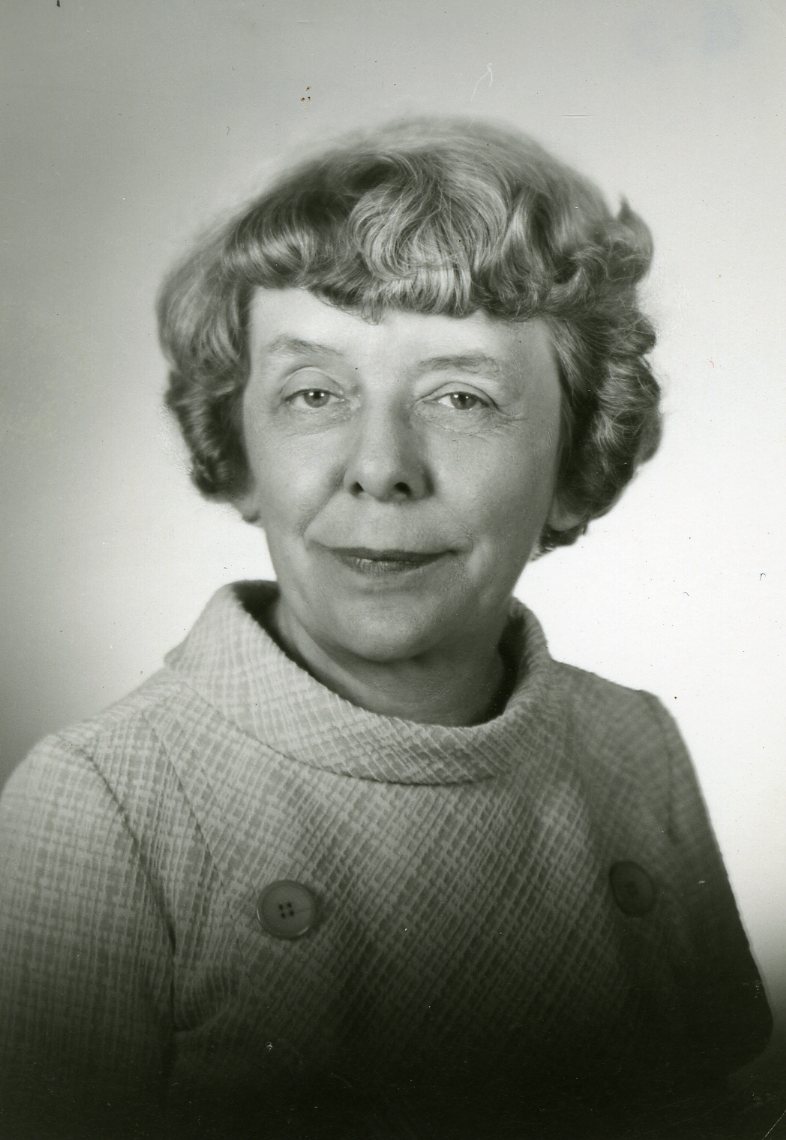 Dorothy Johnson was hired by Concordia College in 1953 as Fjelstad dormitory resident head and assistant to the dean of women. Soon after her arrival she founded the college’s Reading Service to improve students’ reading skills. She also developed an annual Conference on Reading at Concordia and became president of the Minnesota Reading Association in 1966. Dorothy Johnson was hired by Concordia College in 1953 as Fjelstad dormitory resident head and assistant to the dean of women. Soon after her arrival she founded the college’s Reading Service to improve students’ reading skills. She also developed an annual Conference on Reading at Concordia and became president of the Minnesota Reading Association in 1966.
|
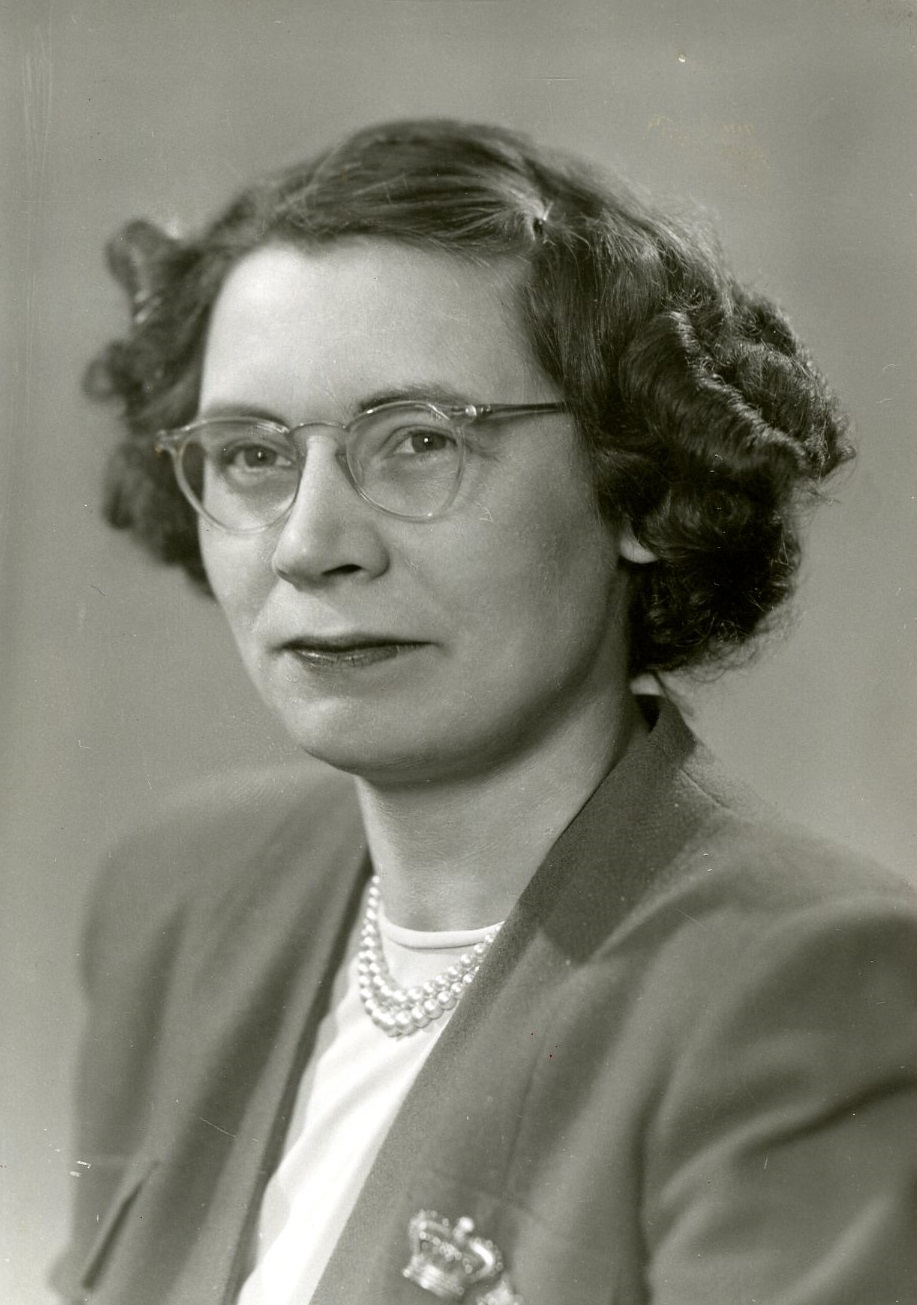 Margaret Nordlie came to Concordia first as a student and then returned to teach classes in library science and work in the library under head librarian Anna Jordahl. In collaboration with Jordahl, Nordlie facilitated the growth of library collections as well as the beginnings of the Concordia College Archives. Margaret Nordlie came to Concordia first as a student and then returned to teach classes in library science and work in the library under head librarian Anna Jordahl. In collaboration with Jordahl, Nordlie facilitated the growth of library collections as well as the beginnings of the Concordia College Archives.
|
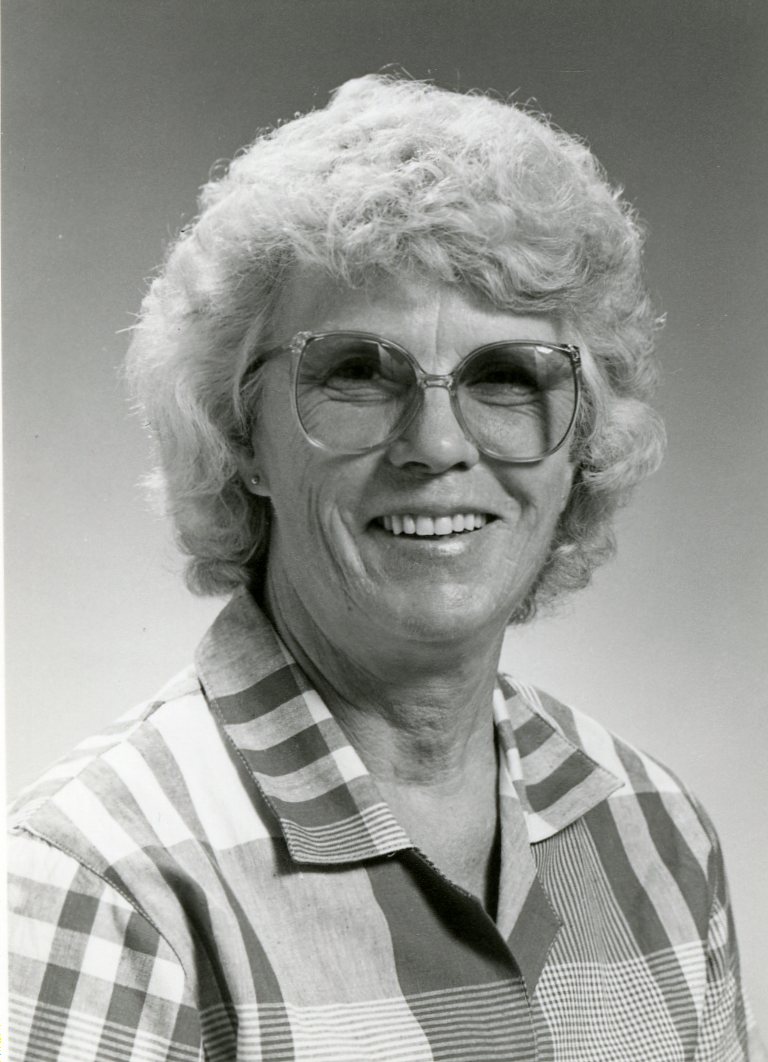 Vivian Wensel was a faculty member of the Concordia physical education program for thirty-five years. She taught over twenty different classes and coached the women’s badminton and golf teams. Through her work on campus and in May travel seminars abroad, she provided a positive role model for young female athletes at Concordia. Vivian Wensel was a faculty member of the Concordia physical education program for thirty-five years. She taught over twenty different classes and coached the women’s badminton and golf teams. Through her work on campus and in May travel seminars abroad, she provided a positive role model for young female athletes at Concordia.
|
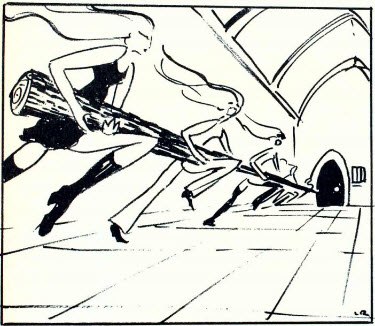 Until the early 1970s, Concordia College imposed restrictive rules and strict regulations pertaining to women’s curfews and lights out. The questioning of authority surrounding the Vietnam War and the feminist movement helped to empower female Cobbers to advocate for their personal freedom. Through a variety of strategies such as demonstrations, lobbying, and expressing opinions in the campus newspaper, women studying at Concordia gained personal freedom and independence when Women’s Hours were eliminated in 1973. Until the early 1970s, Concordia College imposed restrictive rules and strict regulations pertaining to women’s curfews and lights out. The questioning of authority surrounding the Vietnam War and the feminist movement helped to empower female Cobbers to advocate for their personal freedom. Through a variety of strategies such as demonstrations, lobbying, and expressing opinions in the campus newspaper, women studying at Concordia gained personal freedom and independence when Women’s Hours were eliminated in 1973.
|
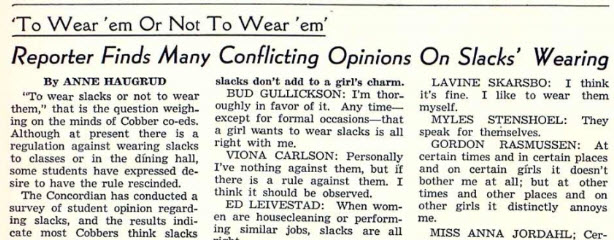 Double standards in the regulation of student conduct at Concordia College placed the liberties of women below those of men. Dress codes and smoking policies in particular explicitly treated female students differently than male students. A combination of student action as well as changing social views brought an end to these sexist differences in regulation over the course of the 1960s and 1970s. Double standards in the regulation of student conduct at Concordia College placed the liberties of women below those of men. Dress codes and smoking policies in particular explicitly treated female students differently than male students. A combination of student action as well as changing social views brought an end to these sexist differences in regulation over the course of the 1960s and 1970s.
|
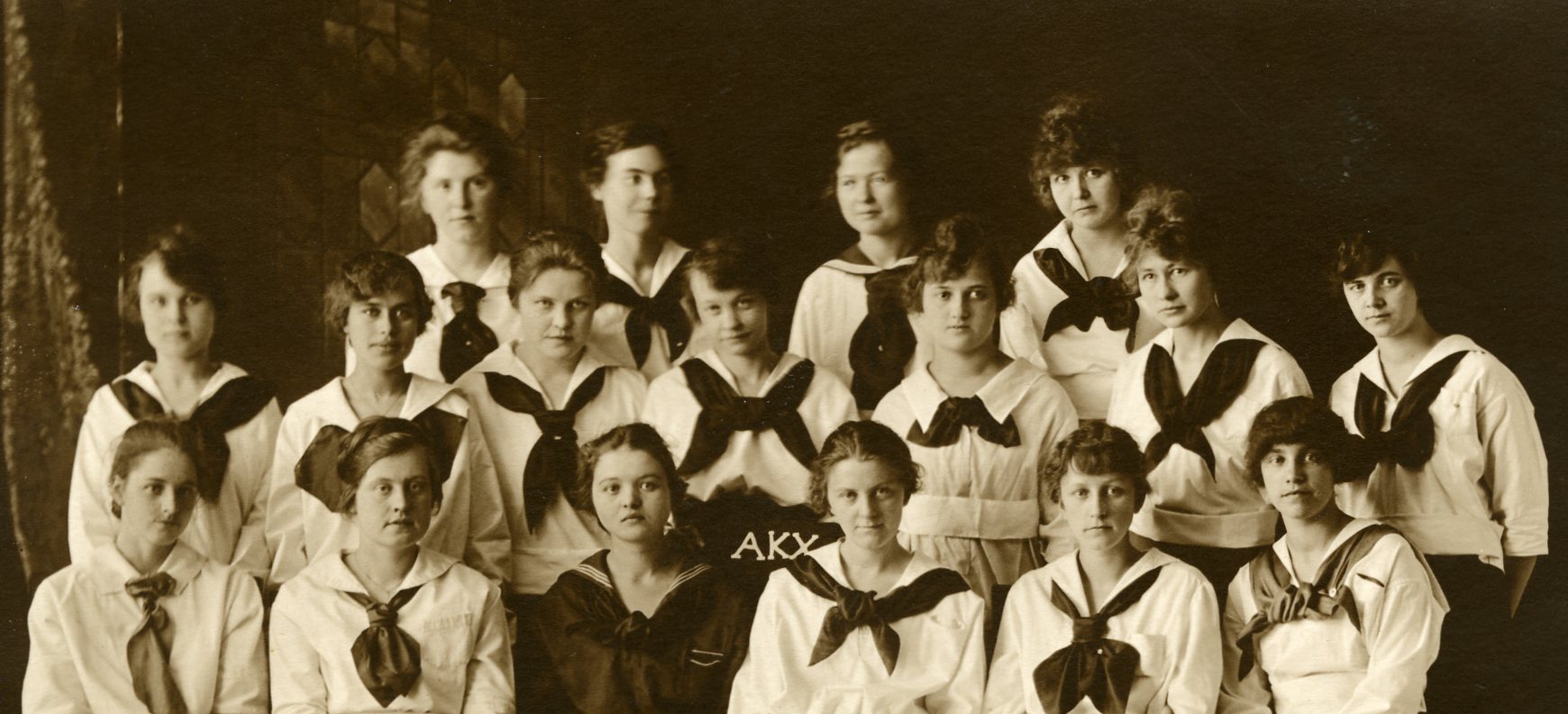 Literary societies were once a common feature at Concordia. Alpha Kappa Chi (AKX) was the first all-female literary society at the college. Even as its focus shifted from literary pursuits to social events to charitable activities, AKX provided a way for Concordia women to engage with their campus and their community for over eighty years. Phi Kappa Chi (PKX) was another major women’s society at Concordia College from 1946 to 1969. Although PKX was relatively short-lived, it provides an interesting look at some of the factors that influenced the rise and fall of women’s (and men’s) societies at Concordia. Literary societies were once a common feature at Concordia. Alpha Kappa Chi (AKX) was the first all-female literary society at the college. Even as its focus shifted from literary pursuits to social events to charitable activities, AKX provided a way for Concordia women to engage with their campus and their community for over eighty years. Phi Kappa Chi (PKX) was another major women’s society at Concordia College from 1946 to 1969. Although PKX was relatively short-lived, it provides an interesting look at some of the factors that influenced the rise and fall of women’s (and men’s) societies at Concordia.
|
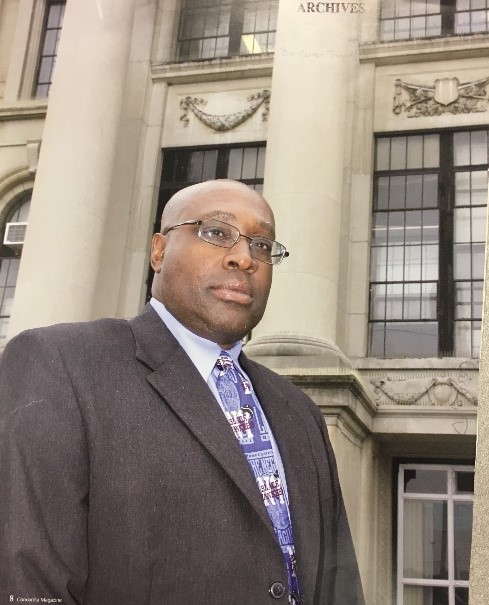 Darnell Carter attended Concordia College from 1971-1975 after growing up in Springfield, Ohio. He became involved in several organizations including Alpha Epsilon Sigma, the Concordian, and Harambee Weuse, the Black Student Union. Graduating from Concordia with degrees in history and English literature, Carter went on to study at Drake University Law School. He enjoyed a successful law career as an assistant prosecuting attorney for Clark County, Ohio from 1980-2008. Carter has also taught high school English, earned a master’s degree in history from Ohio State, and in 2018 received Concordia’s Alumni Achievement Award. Darnell Carter attended Concordia College from 1971-1975 after growing up in Springfield, Ohio. He became involved in several organizations including Alpha Epsilon Sigma, the Concordian, and Harambee Weuse, the Black Student Union. Graduating from Concordia with degrees in history and English literature, Carter went on to study at Drake University Law School. He enjoyed a successful law career as an assistant prosecuting attorney for Clark County, Ohio from 1980-2008. Carter has also taught high school English, earned a master’s degree in history from Ohio State, and in 2018 received Concordia’s Alumni Achievement Award.
|
 Eric Fontaine attended Concordia College during a period of dramatic racial change in higher education, matriculating in 1970 and graduating in 1974. Stepping from the nation’s capital, Fontaine asserted himself on campus through multiple extra-curricular involvements and leadership positions. He served as a guest editorialist for the student paper and as copy editor of the yearbook. In 1973, Fontaine became the first African American student in the college’s history to be elected Student Association president. Following graduation, Fontaine went on to pursue a wide-ranging career as a human resources professional, providing diversity expertise through consulting, coaching, teaching, and training in industry, government, and higher education. Eric Fontaine attended Concordia College during a period of dramatic racial change in higher education, matriculating in 1970 and graduating in 1974. Stepping from the nation’s capital, Fontaine asserted himself on campus through multiple extra-curricular involvements and leadership positions. He served as a guest editorialist for the student paper and as copy editor of the yearbook. In 1973, Fontaine became the first African American student in the college’s history to be elected Student Association president. Following graduation, Fontaine went on to pursue a wide-ranging career as a human resources professional, providing diversity expertise through consulting, coaching, teaching, and training in industry, government, and higher education.
|
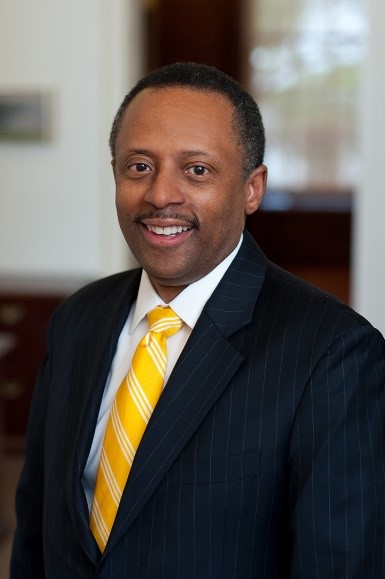 Born in Norfolk, Virginia, Earl Lewis came of age during the hard struggle for school integration in the South, and nationwide, that followed the landmark Brown v. Board of Education decisions (1954-1955). When Lewis studied at Concordia College between 1974 and 1978, the Civil Rights, Black Power, and Black Student Movements had already instigated momentous racial reform in the country’s colleges and universities. He participated in the Black Student Strike in the spring of 1976, a memorable marker in Concordia’s history as black student enrollments reached high tide before receding. Lewis’s academic achievements as an undergraduate anticipated a storied career as a scholar, administrator, innovator and entrepreneur, and leader in higher education. Serious and steady, yet affable and down-to-earth, Lewis embodies Concordia’s commitment to influence the world through studied preparation and dedicated service. Recipient of countless honors and awards, Lewis joined the college’s Board of Regents in 2008 and became chair in 2018. Born in Norfolk, Virginia, Earl Lewis came of age during the hard struggle for school integration in the South, and nationwide, that followed the landmark Brown v. Board of Education decisions (1954-1955). When Lewis studied at Concordia College between 1974 and 1978, the Civil Rights, Black Power, and Black Student Movements had already instigated momentous racial reform in the country’s colleges and universities. He participated in the Black Student Strike in the spring of 1976, a memorable marker in Concordia’s history as black student enrollments reached high tide before receding. Lewis’s academic achievements as an undergraduate anticipated a storied career as a scholar, administrator, innovator and entrepreneur, and leader in higher education. Serious and steady, yet affable and down-to-earth, Lewis embodies Concordia’s commitment to influence the world through studied preparation and dedicated service. Recipient of countless honors and awards, Lewis joined the college’s Board of Regents in 2008 and became chair in 2018.
|
 Concordia’s tradition of crowning a homecoming queen began in the 1920s. Student movements and the influence of the 1960-70s society affected the practice. Due to student concerns, the 1974 Homecoming Chairperson Ken Fitzer substituted the tradition of voting for a homecoming queen with the Don Awards, which was a recognition given to four exemplary senior students. The current practice of crowning both a king and queen began during the homecoming festivities in 1977.
Concordia’s tradition of crowning a homecoming queen began in the 1920s. Student movements and the influence of the 1960-70s society affected the practice. Due to student concerns, the 1974 Homecoming Chairperson Ken Fitzer substituted the tradition of voting for a homecoming queen with the Don Awards, which was a recognition given to four exemplary senior students. The current practice of crowning both a king and queen began during the homecoming festivities in 1977. 







